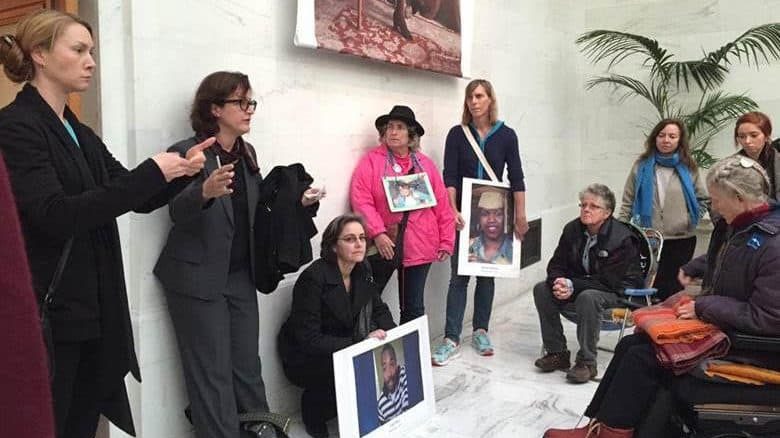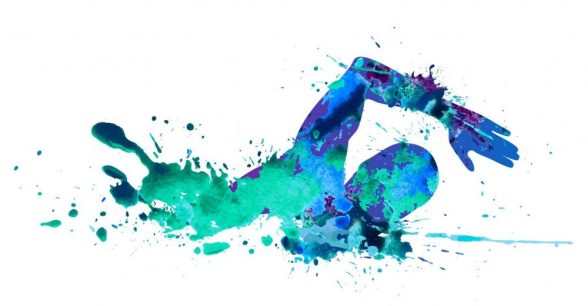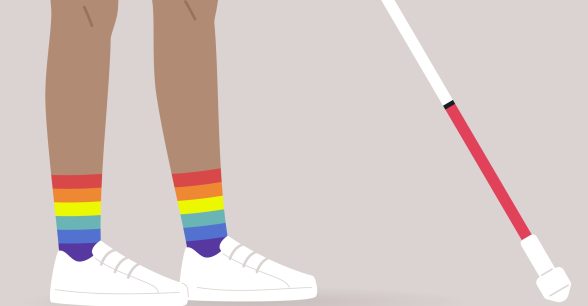Five Questions for ACLU Attorney Susan Mizner
Image description:
A group of people with both visible and hidden disabilities is gathered in the Light Court at City Hall. They are holding posters of people with disabilities who have been killed by the police. An ACLU Disability Rights attorney in glasses, Claudia Center, is speaking and gesturing with her hands. A sign language interpreter is to the left, and ACLU Disability Rights attorney, Susan Mizner is to the right, squatting on the floor and holding a sign of an African-American man with a disability killed by police. Other protestors are listening, standing, sitting in chairs they brought and in wheelchairs. (The photo does not show the entire group of about 35.) From there, we went to occupy City Attorney Dennis Herrera’s office in order to get a meeting about the Sheehan case. We sang the song, “I can hear my neighbor calling ‘I can’t breathe.’ / Now I’m in the struggle and I cannot leave. / Calling out the violence of the racist police. / And I’m not gonna stop – till my people are free.”
You may be hearing a lot about the American Civil Liberties Union (ACLU) right now, as the venerable organization keeps up the offensive when it comes to defending civil liberties, but did you know they’re highly active on disability issues too? I talked with Susan Mizner, an ACLU attorney based in San Francisco who helps with disability rights strategy on issues like defending Medicaid and protecting voting rights.
1) What brought you to disability rights at the ACLU?
Personally, I belong to the disability community. I got very sick when living in China after college; went to law school taking many of my classes from a cot; and had the good fortune to run into Paul Longmore (a disability historian and activist), who helped me recognize that I was part of a community.
Professionally, I have always worked in disability rights. Right out of law school, I worked with homeless people with disabilities advocating for more accessible services. Then I worked in the Mayor’s Office on Disability in San Francisco, becoming the Director in 2003. I served on the Board of the Northern California ACLU affiliate for many years and was always impressed and energized by the intelligence and integrity of the people working there. When I saw the opportunity to work with the National ACLU to expand their disability rights work, I jumped at the opportunity. It has been my dream job.
2) Which voting rights victories are you most proud of?
I am enormously proud of my colleagues in the Voting Rights Project for their work combatting voter suppression efforts around the country — especially in Wisconsin and North Carolina.
The disability-specific work that I am most excited about is getting online voter registration websites to become fully accessible to and useable by people with disabilities.
We did a little audit on just 16 states back in 2014. We thought we would look at what states had the best practices, and what the most common barriers were. We were shocked to find that only California’s website was fully accessible. That led to “Access Denied: Barriers to Online Voter Registration for Citizens with Disabilities.” We used the report to help educate and advocate for accessible online voter registration in states that were starting this new — and in states that were re-doing their websites. There are now a substantial number of states doing a very good job.
3) Can you tell me a little more about the voter registration suit the ACLU is filing in New York?
In New York, we reached out several times to the State Board of Elections to let them know that their website — and the companion website on the Department of Motor Vehicles — was not accessible. We sent them reports on the barriers we had encountered. We tried to persuade them to work with us without litigation — but they kept dragging their heels… and the 2016 election was fast approaching.
So, finally, we felt we had to file suit. We have amazing co-counsel with the National Federation of the Blind and Disability Rights Advocates. And, we have lovely, principled plaintiffs who needed to update their registration and simply couldn’t.
We were able to get a few changes made before the election so that new voters could register much more easily. But, there are still SO many barriers on the sites. We are currently in discovery, looking at documents and taking depositions.
The goal, of course, is not just to get the website “fixed” in one moment in time, but to get the personnel and policies in place so that the website remains accessible. The DMV and Board of Elections websites, like most websites, are very dynamic with new materials posted regularly. If the people posting and maintaining the website don’t know how to ensure accessibility, we will just be back with another lawsuit in a year.
4) Are you concerned about the consequences of potential funding changes to the Election Assistance Commission?
The mission and responsibilities of the EAC are critical. While I appreciate some degree of frustration with its effectiveness, now does not seem to be the time to be challenging its existence. Election technology and communications continue to evolve — and we need a watchdog to ensure that the evolution is both secure and accessible.
5) What do you see as some of the biggest issues in the voting rights arena that disabled people should be agitating around?
Voter Suppression. Anyone who cares about the integrity of our voting process should be up in arms at the efforts to make the process of voting harder, instead of easier.
Cutting back on pre-voting days, requiring government issued identification, making registration harder, kicking people off the registration rolls without checking if they are still residents — these are all partisan efforts to prevent certain portions of U.S. citizens from voting.
We need to recognize that, even though much of the focus of these efforts has been on people of color, there is enormous overlap with people with disabilities. It’s not ‘either/or.’ The people who are most likely not to have government issued ID are people with disabilities — and, even more likely if they are people with disabilities of color. For the disability community, this is an opportunity to recognize the intersectionality of our issues, to embrace this overlap, and to fight together. We are always stronger together.
About Rooted In Rights
Rooted in Rights exists to amplify the perspectives of the disability community. Blog posts and storyteller videos that we publish and content we re-share on social media do not necessarily reflect the opinions or values of Rooted in Rights nor indicate an endorsement of a program or service by Rooted in Rights. We respect and aim to reflect the diversity of opinions and experiences of the disability community. Rooted in Rights seeks to highlight discussions, not direct them. Learn more about Rooted In Rights



